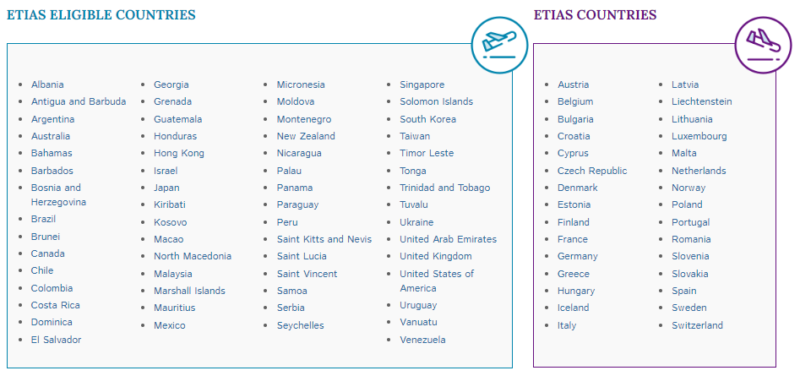WHAT IS THE ETIAS VISA WAIVER?
ETIAS stands for European Travel Information and Authorisation System. The main goal of ETIAS for Europe is to identify possible threats or risks associated with visitors travelling to any of the Schengen Area countries. ETIAS protects and strengthens Europe’s borders.
The ETIAS travel authorisation will be needed to enter a Schengen member country by air, land or sea. From 2024, visitors that do not need a visa to enter Europe will be able to register with ETIAS. ETIAS will become a mandatory entry requirement.
Visa-exempt visitors non-EU citizens need to apply for an ETIAS visa waiver when visiting the Schengen zone. There are no internal borders between Schengen member countries.
ETIAS IS AN ELECTRONIC TRAVEL AUTHORISATION, NOT A VISA
ETIAS is a travel authorisation for non-EU nationals who do not need a visa for the Schengen Area. ETIAS is not a European visa.
Nationals of more than 50 non-European countries are exempt from applying for a visa to visit the Schengen Area for up to 90 days.
The ETIAS visa waiver has been developed so that travellers from these countries can continue to enter visa-free, while at the same time improving border management and security across Europe.
Visa-exempt visitors will soon be required to register for the new electronic travel authorisation, also known as a visa waiver, to cross an external Schengen border.
COUNTRIES WHOSE CITIZENS REQUIRE ETIAS FOR EUROPE
There are more than 50 eligible countries that will be required to submit an online ETIAS application. Citizens of these countries can travel to Europe without a visa. The ETIAS for Europe is a system that will pre-screen travellers before they board a plane. All information provided on the ETIAS application will be closely examined and checked against security databases.
The ETIAS visa waiver will be valid for short-term stays and for business or leisure purposes. It can also be used to study for up to 90 days.
People who wish to stay long-term or work in Europe need to apply for a visa.
Once approved, an ETIAS can be used for 3 years or until the passport expires, whichever comes first.
The EU decided to implement ETIAS to improve security in the Schengen Area. By obtaining a travel authorisation, visa-free travellers will still undergo a security check prior to their arrival in the EU.

COUNTRIES IN EUROPE THAT WILL REQUIRE AN ETIAS
ETIAS will be required to travel to the Schengen Area countries plus Bulgaria, Cyprus, and Romania which are in the process of joining the Schengen Area.
Citizens of the EU travelling in the Schengen Area can do it with either their national identity card or passport, and are not subject to any other type of border control at their mutual borders.
ETIAS: HOW DOES IT WORK?
ETIAS works by screening passengers arriving in the Schengen Area from third countries.
To protect against potential threats and ensure the integrity of Schengen’s external borders, data will be collected and assessed before passengers travel to Europe.
WHICH SECURITY DATABASES DOES ETIAS CHECK?
Information submitted through an ETIAS visa waiver application is automatically cross-referenced against several criminal, travel and informational databases.
The following systems are consulted:
- Schengen Information System (SIS)
- Visa Information System (VIS)
- ETIAS Watchlist
- Eurodac
- Entry/Exit System (EES)
- Europol
- European Criminal Records Information System (ECRIS)
- eu-LISA
If there is an alert in any of the systems, the application is reviewed manually by the ETIAS National Unit responsible. An interview may be required in fewer than 0.1% of cases. The application is then approved or denied.
THE GUIDING PRINCIPLES OF THE ETIAS REGULATION
These are the key principles established by the European Union. ETIAS should be:
- Affordable: Applicants will have to pay a reasonable one-off fee using a credit or debit card to submit the online application.
- Fast and simple: Completing the application should not take more than 10 minutes and automatic approval will be given in over 95% of cases.
- Effective: All the information provided will be cross-checked against numerous EU data systems including Europol and Interpol.
- Clear and fair: When authorisation is refused, the applicant will need to be informed about the decision within 96 hours. Applicants will always have the right to appeal refusals.
WHEN DOES EU ETIAS BECOME OBLIGATORY?
ETIAS was first proposed in 2016 by the European Commission and formally established in September 2018 by the Regulation (EU) 2018/1240 of the European Parliament and of the Council.
ETIAS will be operational from 2024. It will become an entry requirement for all visa-exempt non-EU citizens travelling to the Schengen Area.
font: https://www.etiasvisa.com/


